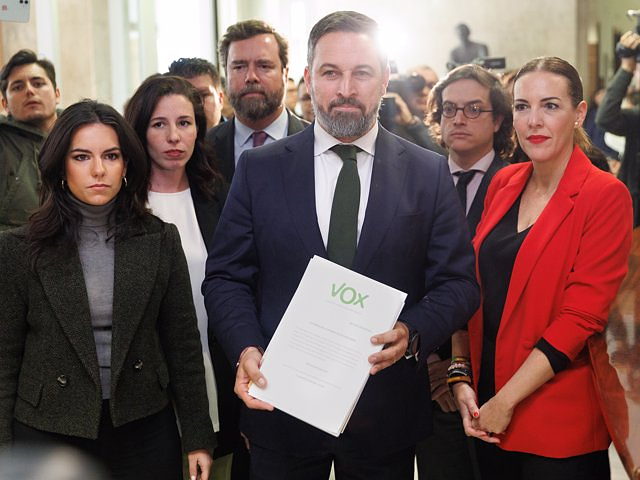When qualified by the Board, a period of two days will open for other groups to present motions with alternative candidates
MADRID, 27 Feb. (EUROPA PRESS) -
The president of Vox, Santiago Abacal, accompanied by his parliamentary spokesman, Iván Espinosa de los Monteros and other party deputies, have registered this Monday in Congress the motion of censure presenting the economist Ramón Tamames as a candidate for the Presidency of the Government.
It is the sixth motion of censure of democracy, the first with an independent candidate and the second promoted by Vox this legislature. Once registered, the date of its debate is now in the hands of the president of the Chamber, Meritxell Batet, although in no case will it be before mid-March.
Santiago Abascal announced two and a half months ago that they would present a new motion of censure against Pedro Sánchez due to the "urgency" of evicting the PSOE and Unidas Podemos government from the Moncloa Palace.
However, he said that he did not want to lead it himself - as it did in October 2020 - and Vox launched itself in search of a candidate who met three characteristics: independent, with government experience and who would acquire the commitment of the call immediate general election.
After weeks of waiting, the name of Ramón Tamames finally came to light, which Vox formalized last Wednesday as a candidate once the main lines of the speech he delivered before the Plenary of the Lower House had been agreed.
Once registered, the clock starts ticking for your debate. Pursuant to the Regulations, the first procedure for the motion of censure is the qualification of the document by the Congress Bureau, which must verify if it meets the formal requirements that are required: the signature of at least one tenth of Congress (35 deputies) and the name of a candidate for the Presidency.
In this case, it is not guaranteed that there will be time for the Board to qualify the writing at its meeting the following day, since the usual thing is to close the agenda of the governing body of the Chamber with what has been registered until the previous Saturday.
However, given the exceptionality of the mechanism of the motion of censure, the Board could agree to give its approval on Tuesday. Once the document has been qualified, either this Tuesday, February 28 or the following week, March 7, it will be sent to the President of the Government and to the spokespersons of the different parliamentary groups so that they are informed and study it.
That is when a period of two days will open to give the opportunity to present motions with alternative candidates, for which the same requirements are required and which, where appropriate, will be discussed jointly.
To allow time for this process, the vote on the motion or motions of censure may not take place before five days from the presentation of the first document, but the date will depend on the Presidency of Congress. It is foreseeable that the Chamber will take into account the government's agenda and that it will survey the main groups.
Thus, in the Chamber it is not expected that the debate will be set before mid-March. According to the Presidency of Congress, they will act based on precedents, which over the years have already varied.
Vox's last motion of no confidence took 21 days to be debated from its presentation. But the one that Pedro Sánchez presented in May 2018 only took a scant week to reach plenary, and it is that on that occasion the PP chose to rush the date mistakenly convinced that, after approving the Government Budgets, the censorship of the PSOE was destined for failure.
The PP of Mariano Rajoy and Ana Pastor took more time with the motion of no confidence by Pablo Iglesias, which was registered on May 19 and debated on June 13, almost a month later. The Podemos initiative had no chance of prospering, since not even the PSOE supported it, and the PP was in no hurry to debate it.
The mechanics of the debate foresees that the candidate will be presented before the Plenary by one of the signatory deputies, who in this case Vox has already announced will be Abascal himself. In 2020, he himself was the candidate and was presented by his then head of the poster for the elections in Catalonia, Ignacio Garriga, the same role played by the PSOE Organization Secretary, José Luis Ábalos, in 2018 with Sánchez, and the ' number two' of Podemos, Irene Montero, with Pablo Iglesias in 2017.
In accordance with parliamentary customs, the candidate debates with the Government, which chooses who gives the reply, and with the different parliamentary groups. In any case, the candidate sets the pace and in this case Ramón Tamames, 89, will decide how he will respond to the other groups. Unless speaking turns are reduced to a minimum, the next day will come the vote, which is public and by call, with each deputy expressing out loud the meaning of his vote.
To prosper, the motion of no confidence requires obtaining an absolute majority in Congress (176 votes), an objective that seems unattainable given the positions expressed by the groups in recent weeks.

 Exploring Cardano: Inner Workings and Advantages of this Cryptocurrency
Exploring Cardano: Inner Workings and Advantages of this Cryptocurrency Seville.- Economy.- Innova.- STSA inaugurates its new painting and sealing hangar in San Pablo, for 18 million
Seville.- Economy.- Innova.- STSA inaugurates its new painting and sealing hangar in San Pablo, for 18 million Innova.- More than 300 volunteers join the Andalucía Compromiso Digital network in one month to facilitate access to ICT
Innova.- More than 300 volunteers join the Andalucía Compromiso Digital network in one month to facilitate access to ICT Innova.-AMP.- Ayesa acquires 51% of Sadiel, which will create new technological engineering products and expand markets
Innova.-AMP.- Ayesa acquires 51% of Sadiel, which will create new technological engineering products and expand markets Study identifies new genetic form of Alzheimer's
Study identifies new genetic form of Alzheimer's Judge Juan Merchan fines Trump for contempt of court in 'Stormy Daniels' bribery case
Judge Juan Merchan fines Trump for contempt of court in 'Stormy Daniels' bribery case The Ibex 35 rises 0.58% at closing thanks to the boost from Indra and Grifols
The Ibex 35 rises 0.58% at closing thanks to the boost from Indra and Grifols STATEMENT: Yantai Holds “When Yantai Met Bordeaux” Wine Gift Box Launch Event
STATEMENT: Yantai Holds “When Yantai Met Bordeaux” Wine Gift Box Launch Event How Blockchain in being used to shape the future
How Blockchain in being used to shape the future Not just BTC and ETH: Here Are Some More Interesting Coins Worth Focusing on
Not just BTC and ETH: Here Are Some More Interesting Coins Worth Focusing on UMH researchers are working on a high-quality apricot crop that requires less irrigation water
UMH researchers are working on a high-quality apricot crop that requires less irrigation water The UPV develops an application to improve the quality of life of patients with glioblastoma
The UPV develops an application to improve the quality of life of patients with glioblastoma A sensor system obtains the fingerprint of essential oils and detects if they have been adulterated
A sensor system obtains the fingerprint of essential oils and detects if they have been adulterated Faraday UPV presents the 'Origin' rocket to exceed 10 km of flight: "It is the beginning of the journey to space"
Faraday UPV presents the 'Origin' rocket to exceed 10 km of flight: "It is the beginning of the journey to space" A million people demonstrate in France against Macron's pension reform
A million people demonstrate in France against Macron's pension reform Russia launches several missiles against "critical infrastructure" in the city of Zaporizhia
Russia launches several missiles against "critical infrastructure" in the city of Zaporizhia A "procession" remembers the dead of the Calabria shipwreck as bodies continue to wash up on the shore
A "procession" remembers the dead of the Calabria shipwreck as bodies continue to wash up on the shore Prison sentences handed down for three prominent Hong Kong pro-democracy activists
Prison sentences handed down for three prominent Hong Kong pro-democracy activists ETH continues to leave trading platforms, Ethereum balance on exchanges lowest in 3 years
ETH continues to leave trading platforms, Ethereum balance on exchanges lowest in 3 years Investors invest $450 million in Consensys, Ethereum incubator now valued at $7 billion
Investors invest $450 million in Consensys, Ethereum incubator now valued at $7 billion Alchemy Integrates Ethereum L2 Product Starknet to Enhance Web3 Scalability at a Price 100x Lower Than L1 Fees
Alchemy Integrates Ethereum L2 Product Starknet to Enhance Web3 Scalability at a Price 100x Lower Than L1 Fees Mining Report: Bitcoin's Electricity Consumption Declines by 25% in Q1 2022
Mining Report: Bitcoin's Electricity Consumption Declines by 25% in Q1 2022 Oil-to-Bitcoin Mining Firm Crusoe Energy Systems Raised $505 Million
Oil-to-Bitcoin Mining Firm Crusoe Energy Systems Raised $505 Million Microbt reveals the latest Bitcoin mining rigs -- Machines produce up to 126 TH/s with custom 5nm chip design
Microbt reveals the latest Bitcoin mining rigs -- Machines produce up to 126 TH/s with custom 5nm chip design Bitcoin's Mining Difficulty Hits a Lifetime High, With More Than 90% of BTC Supply Issued
Bitcoin's Mining Difficulty Hits a Lifetime High, With More Than 90% of BTC Supply Issued The Biggest Movers are Near, EOS, and RUNE during Friday's Selloff
The Biggest Movers are Near, EOS, and RUNE during Friday's Selloff Global Markets Spooked by a Hawkish Fed and Covid, Stocks and Crypto Gain After Musk Buys Twitter
Global Markets Spooked by a Hawkish Fed and Covid, Stocks and Crypto Gain After Musk Buys Twitter Bitso to offset carbon emissions from the Trading Platform's ERC20, ETH, and BTC Transactions
Bitso to offset carbon emissions from the Trading Platform's ERC20, ETH, and BTC Transactions Draftkings Announces 2022 College Hoops NFT Selection for March Madness
Draftkings Announces 2022 College Hoops NFT Selection for March Madness




























